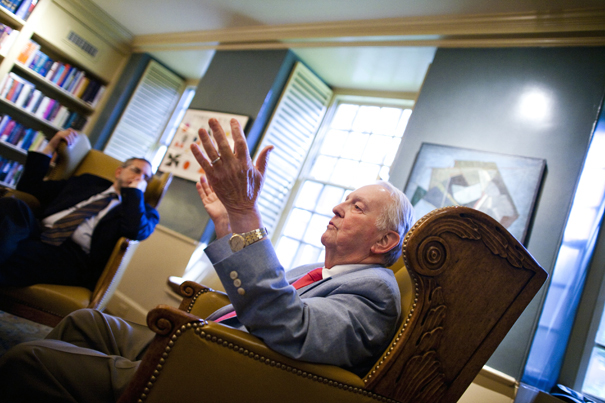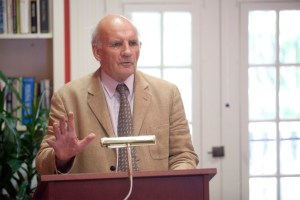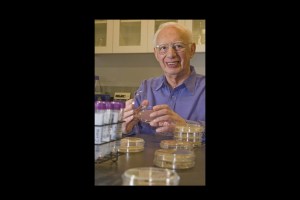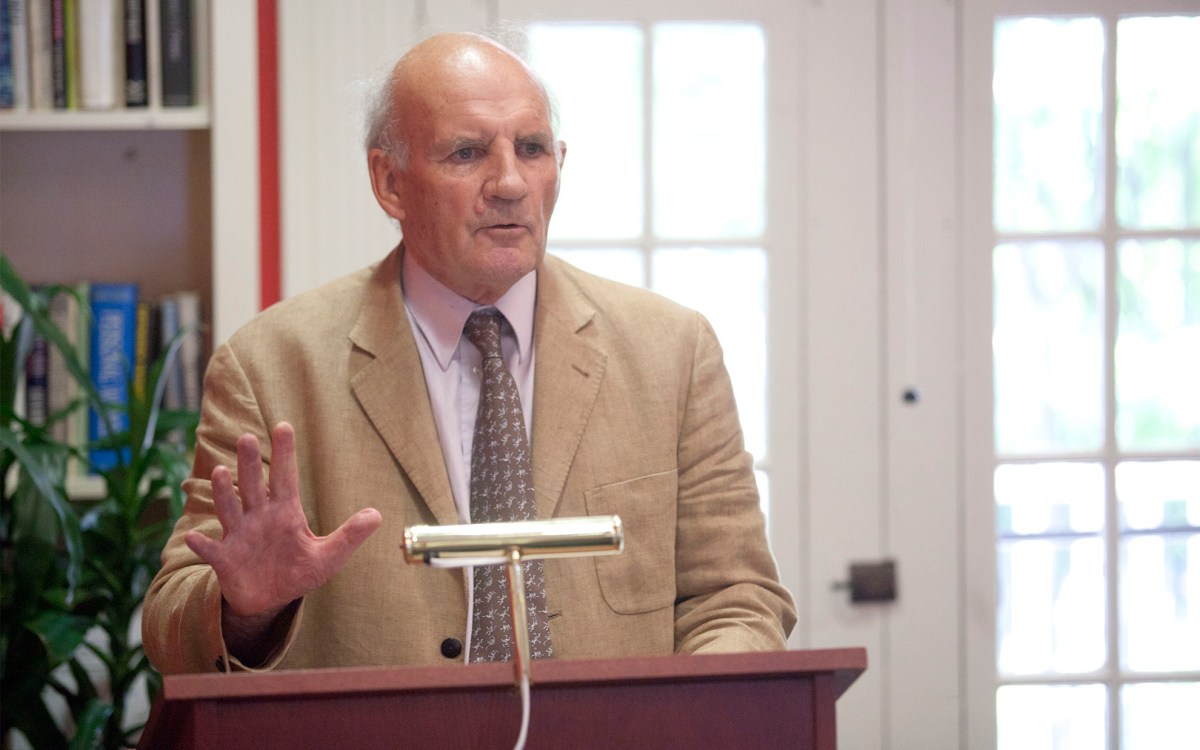
Harvard University Provost Steven E. Hyman (left) and Vice Provost for Research David Korn speak about the implementation of the University’s new conflict of interest guidelines.
Stephanie Mitchell/Harvard Staff Photographer
Conflict of interest policy adopted
Schools to tailor policies in sync with University document
The Harvard Corporation has adopted a University-wide conflict of interest policy, the first time such a policy has been crafted to cover faculty members across the entire campus. Drafted by a faculty committee chaired by Vice Provost David Korn, it is intended to serve as a framework within which each of the Schools will tailor rules to the specific circumstances of their faculties. It is expected that every School will produce a set of policies that is at least as stringent as those in the guidelines set out in the University policy, and that some will be even more stringent. The Gazette sat down with Provost Steven E. Hyman and Vice Provost Korn to discuss the way the new University-wide policy was developed, and the impact it is expected to have.
Gazette:
Why was it necessary, at this specific moment in time, to draft a University-wide conflict of interest policy?
Hyman:
Harvard is increasingly committed to research that might lead to products that will improve the lot of humankind. In our society, products make it out of the lab and into the world — where they can create benefit — through a process of commercialization. So some Harvard faculty are being encouraged to commercialize their research or otherwise engage with the private sector, in addition to writing papers for publication in notable journals.
At the same time we are encouraging this kind of collaboration with private industry, it’s also important that we address our rules governing financial conflicts of interest. It’s very important to note that we’re living in a period of history when the news media, the general public, and members of Congress and government agencies are very concerned that potential financial conflicts might interfere with the kind of objective exploration and reporting of science that is at the very heart of the academic enterprise.
Korn:
The University is not designed to be an ivory tower isolated from the world. So the trick is to be able to have a robust system for affording faculty opportunities to engage with the commercial world and at the same time not threaten in any way their own fundamental integrity or that of Harvard.
Gazette:
But these guidelines apply to far more than just work in the sciences, don’t they? Aren’t they meant to guide the formation of policies at Schools as diverse as the Divinity School, the School of Education, the School of Engineering and Applied Sciences, and Harvard Medical School?
Hyman:
They are. And it’s very important to realize that while most commercialization used to occur only in a small number of departments and a minority of Schools, increasingly we see more and more collaboration across departmental and School boundaries. For example, we see connections between engineering and chemistry in FAS [Faculty of Arts and Sciences] and the Medical School, or between diverse parts of the University and the School of Public Health, where again faculty may be engaged in private sector collaborations or commercialization. Policymakers outside the University and our own governing bodies — that is the Harvard Corporation and the Board of Overseers — encouraged us to develop a set of policies that could apply to the whole University, rather than creating artificial boundaries with nothing but separate policies. And then David and the committee came up with the really inspired idea that while we should be governed by a shared set of principles, given the different cultures of the diverse faculties at our University, with different kinds of engagement with the private sector, implementation should be a matter that is School-specific, with the proviso that School basic implementations can’t deviate from the spirit or the letter of the University policy.
Korn:
The frontiers of much scholarship, especially in the sciences — basic and applied, behavioral and natural — are increasingly multidisciplinary because the problems now on the table are so large and complicated; teams of individuals from multiple disciplines have to come together with their various resources to make these huge projects tractable. And it simply isn’t feasible to have a team in any walk of life, whether it’s research or whether it’s basketball or football, where the team members play under different rules and behavioral expectations. It just doesn’t work. It’s certainly true that many of the Schools in the University had in their own faculty policy publications some mention of conflicts of interest. But in many instances they were neither concordant nor robust, so building a policy that would enable the Schools to become more harmonized in the ways they deal with these matters was a driving goal of the committee that we formed to wrestle with this issue.
Gazette:
So we now have an overarching University-wide policy that sets the parameters for the development of individual School policies. And the Medical School has completed a revision of its existing policy, creating conflict of interest standards that in many areas exceed the University guidelines. What about the other Schools — is there a set time by which they must create policies?
Hyman:
We haven’t set a time limit yet. In the early fall, David and I will sit down and take the necessary steps toward creating School-based implementations of the policy. I think it’s critical that David and his colleagues [on what will be a standing committee on conflict of interest] provide technical assistance, because for some of the Schools, this is a very new set of ideas. For Schools that are already engaged in science, engineering, and quantitative social science, these are not new issues. We’ve already begun a series of discussions with the deans of Arts and Sciences, Medicine, Engineering, and Public Health about School-based implementations. And those deans, well aware of the extraordinary degree of collaboration that occurs among the faculty their Schools, have pledged themselves to creating implementations that are as like to each other as possible, and in particular, having identical implementations with respect to human subjects research or clinical research, so that faculty don’t face what might be called bureaucratic double jeopardy when they engage in collaborative projects.
Korn:
It’s important to realize that the cultures and practices and historic interactions within the Harvard community vary enormously across the Schools. For example, the Business School exists to create leadership in the business community. And to do that requires the inculcation of values and skills necessary to achieve that objective, requires that there be much more interaction between students and faculty with business entities, than say might be necessary or considered normal in a philosophy department, or an arts department. Similar interactions are often necessary in the School of Education, and in the Design School. And yet the ways in which these different disciplines and professions practice these interactions also vary, as does the culture of what is considered appropriate and what isn’t. And none of that means that one is right and one is wrong. It’s just that the rules of a medical school would be entirely inappropriate in many respects for a law school or school of education. That’s why flexibility in how the policy is implemented is incredibly important in a University with such diverse areas of scholarship and professional education. It’s virtually impossible to get a one-size-fits-all policy that isn’t strained and artificial and unnecessarily burdensome.
Gazette:
Dr. Korn, as a graduate of the College and Harvard Medical School, you were familiar with much that is unique about Harvard. But you’d been away for decades, at Stanford, where you were chair of the Department of Pathology, and then dean of the School of Medicine, and then at the Association of American Medical Colleges, where you were a vice president. Given that time away, what surprised you the most when you returned here to take on this task?
Korn:
The unique feature, which I knew about but hadn’t thought about for a very, very long time, is the remarkable decentralization of the University. That in a lot of ways creates an interesting challenge for any form of central guidance or leadership, no matter what it is. The Schools have historically been very independent, and they have thrived in their independence. And the idea of coming together to develop University-wide policies is not common. So when Steve and I put the committee together to take on this task, we agreed we’d have representation from every School. We weighted the committee a bit with three members from FAS, acknowledging the three divisions, and three members from the Medical School — including hospital-based professors who are highly regarded as leaders of the academic medical community. Every other School had a single member. When the committee met initially I asked each member to introduce him or herself, and asked that they speak about conflict of interest matters that they were aware of in their own areas that bothered them. That led to an incredible amount of enthusiastic participation. The second thing we did was to get the members to define the goals, missions, and values of Harvard University. That wasn’t part of our charge, but I decided to ask the committee members to articulate what they thought were the missions and values of the University. The reason that was important was that from that point forward, the entire discussion of financial conflicts of interest and how to manage them was driven by the shared agreement, that these missions and values were core and had to be protected from any sort of undermining or tarnishing. And it was that shared agreement on what it is we’re trying to protect that really drove the process, I thought, very, very nicely to the endpoint late last fall. Everybody joined in the melee: They all contributed and they all signed off in the end. I thought the process worked extraordinarily well.
Gazette:
Is this the first time in Harvard history that there’s been such a collaborative project by representatives of all the Schools?
Hyman:
I can’t speak to Harvard history, but certainly in my time here we’ve never had a process that involved so many iterations among all of the deans, a committee representing faculty from the entire University, our governing bodies. And what’s remarkable, and here I refer back to something that David said, which is very important for many parts of the University: This was very new, but everybody understood it was very consequential and very important that we get it right, that we not stifle innovation and connection to the private sector, but that we create a set of policies that were clear and that would make sure that our values didn’t become transgressed in those interactions. So clearly, he had a stiff challenge.
There were times hearing David’s reports and in talking to the deans when I was worried that there was too large a gulf between the Schools that support science and engineering and the rest of the University. And I was quite pleased to see everybody come together so quickly and produce such an effective document. Of course, the work isn’t done yet. We still need these implementations. But I have a lot of confidence that we’ll get there, partly because David and his colleagues on what will be a standing successor committee are committed to making this work.
Gazette:
So, the next step is forming a new standing committee on financial conflicts of interest, which will aid the Schools in the development of their policies and will ultimately have to approve those policies. Then what?
Korn:
The University Standing Committee on Financial Conflicts of Interest will be the formal instrument for overseeing the implementation plans of the various Schools. It will be available for consultation with the Schools. It will have to approve the implementation plans of each School. And it will be the body that will receive the audit reports that the policy also calls for. Harvard’s Risk Management and Audit Services is to audit each School at least once every three years to obtain insight and evidence of how well the Schools are employing the policy. And the audit reports will be given to me and shared with the committee so that the committee gains insight into how the Schools are complying, or where there may be problems that need some help, or where some aspect of the policy may simply not be working out as well as it sounded in concept, in which case we might propose some modifications to the President and Provost.
Faculty members in each School will file both annual and transactional reports. Transactional reports will be filed for specific things, such as gifts or contracts or such, in which the faculty member or their immediate family has what the School regards as a significant financial relationship with the donor or sponsor that might be seen as creating a conflict of interest. The Schools are given a fair amount of discretion in how they’re going to implement this requirement, and among those discretions will be deciding what kinds and magnitudes of financial relationships their faculty might have that the Schools need to know about.
Hyman:
One really important thing that David is touching on is that the policy will call for disclosure of relevant potential conflicts of interest to the dean of a School. This does not imply that these disclosures will be made public, and I think that’s something that has been misunderstood. Now in medicine, there are both federal laws affecting drug companies and state laws that will lead to some disclosures being made public. It is important to note that it has become part of our culture to expect that if a physician wants to consult with a pharmaceutical company, that consultation will become a matter of public record with the view, shared by many, that some patients will want to know whether their doctor is engaged with or getting compensation from a pharmaceutical or medical device company. But as a matter of University policy, a Law School faculty member, for example, or a Design School faculty member making a disclosure to the dean will not have these disclosures made available to the public.
Gazette:
Isn’t this process of internal review much like the Institutional Review Board process for research involving human subjects, a process in which there is a careful, detailed review, but that review is confidential?
Korn:
I think, in a way, that’s a fair analogy. The process won’t be identical, but it will require a similarly careful, fact-driven balancing of risks and benefits, and then making decisions about whether and how to allow the research to go forward — or not.




